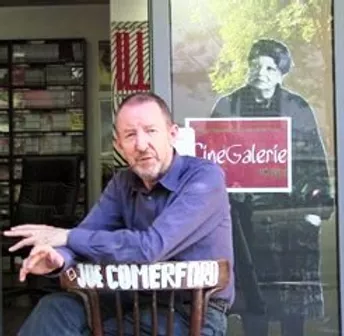- Joe Comerford
- puddlefilms@eircom.net
- +353 (0) 61925127
- Spaights Park, Caher, Co. Clare
DIRECTORS

Contact
Filmography
-
High Boot Benny
1993 — Feature Film — 82 mins -
Reefer and the Model
1988 — Feature Film — 93 mins -
Waterbag
1984 — Short Film -
Withdrawl
1982 — Short Film — 26 mins -
Traveller
1981 — Feature Film — 81 mins -
Down the Corner
1977 — Feature Film — 60 mins -
Emtigon
1970 — Short Film -
Swan Alley
1969 — Short Film — 5 mins
Awards
- 1988 — Nominee
European Film Awards — Best Young Film. Reefer and the Model - 1994 — Nominee
Karlovy Vary International Film Festival — Crystal Globe. High Boot Benny - 1982 — Special Mention
Locarno International Film Festival — . Traveller
Joe Comerford was born in Dublin in 1947 and became involved in filmmaking while studying at the National College of Art and Design in the 1960s. In the early 1970s, he worked for RTÉ (Ireland’s national broadcaster), where he trained as a camera operator as well as in general studio production. Comerford later admitted, however, that he found it difficult to work within the institutional constraints of RTÉ. He left in 1972 to begin a long and distinguished career as an independent filmmaker whose own film practice was to challenge the conventions of popular studio production.
In the 1970s, little in the way of funding existed for independent production in Ireland, so Comerford was drawn inevitably into a political role as well. He was a founding member of the Association of Independent Producers (AIP) with fellow independent filmmakers like Bob Quinn, Cathal Black, Pat Murphy and Thaddeus O’Sullivan, all of whom worked on each other’s films in these formative years. Throughout the late 1970s, the AIP lobbied government on behalf of the fledgling independent sector and was finally vindicated in 1981 when the government established the first Irish Film Board.
Comerford‘s own films illustrate well his commitment to a form of politically engaged and aesthetically challenging cinema that was impossible within the constraints of television. His early short films – Swan Alley (1969), Emtigon (1972), Withdrawal (1974, later re-edited and re-worked in 1982) and Down the Corner (1978) – demonstrate this predilection for an experimental, avant-garde practice. All his films are elliptical and narratively complex, challenging the audience to make sense of seemingly unmotivated plot turns. Over the years, however, he has applied this essentially avant-garde sensibility to a relentless exploration of social and political issues, giving his experimental forms the unadorned flatness of naturalist filmmaking.
Comerford has also been particularly concerned with the political situation in Northern Ireland, and the conflict there has been a theme in most of his films. His three feature films – Traveller (1981), Reefer and the Model (1988) and High Boot Benny (1993) – share a general concern with those on the margins of an increasingly affluent Irish society, but Comerford is particularly concerned in these films to explore the political and cultural implications of violence in Northern Ireland.
In his most critically-successful film Reefer and the Model (winner of the Europa prize for best film in 1988) his marginal characters – a prostitute, a gay man, a republican on the run from Northern Ireland and a disenchanted criminal – form an alternative ‘family’ to that of the official nation. This attempt to re-imagine Ireland in radical ways has been a feature of Comerford‘s filmmaking throughout his career and in the commercial climate of the 1990s and beyond, his challenging vision has been largely out of favour. Thus, despite a long and distinguished contribution to filmmaking in Ireland, he has been able to make relatively few films and, as the Europa prize testifies, he has found critical favour more often abroad than in Ireland itself.
(BFI ScreenOnline)